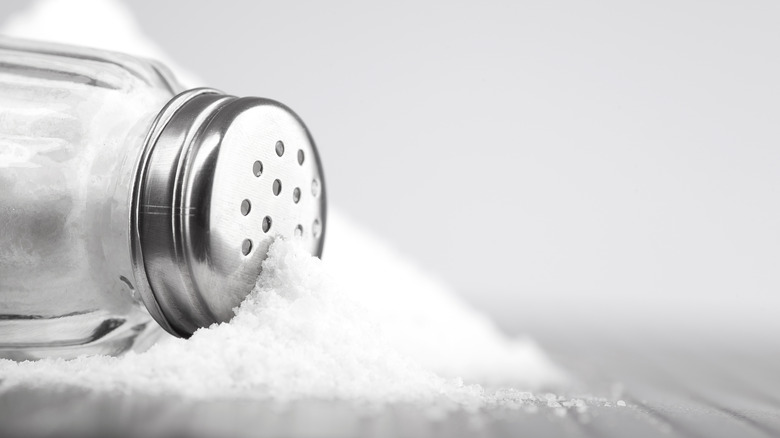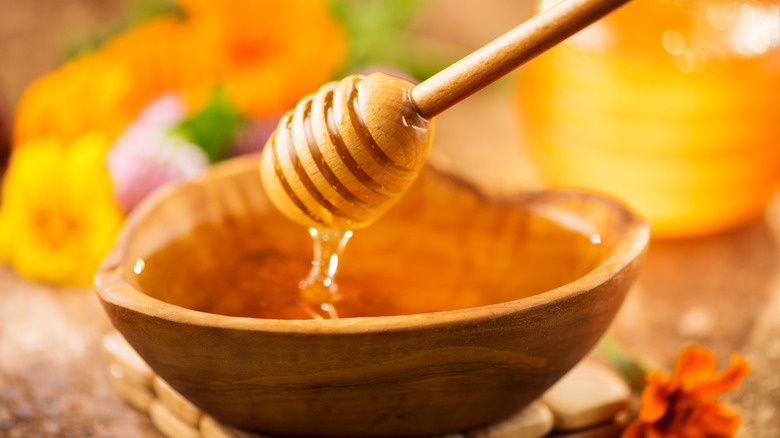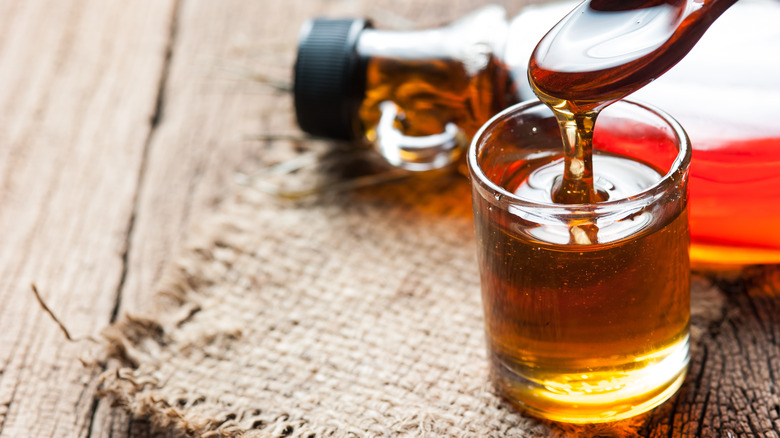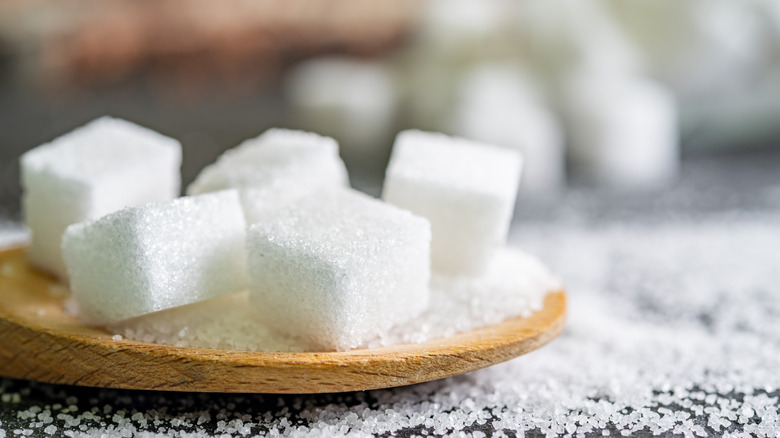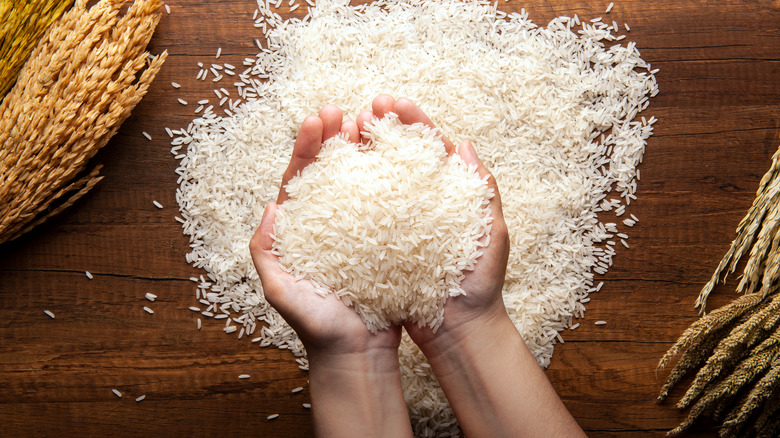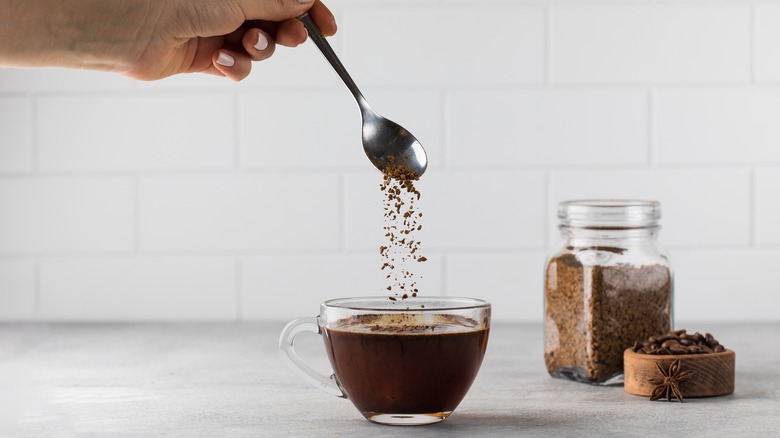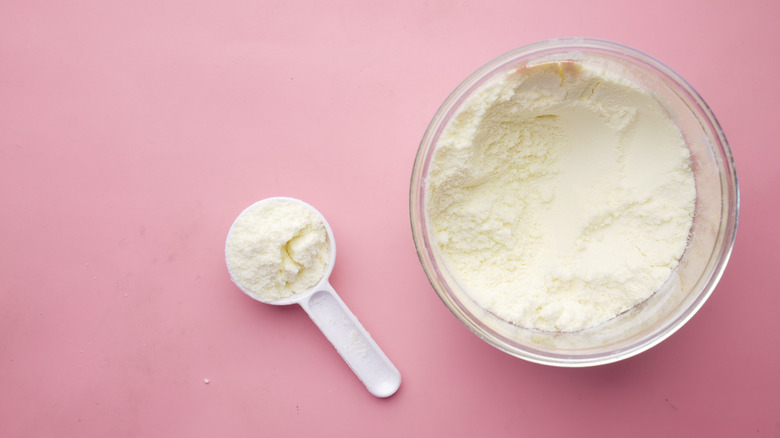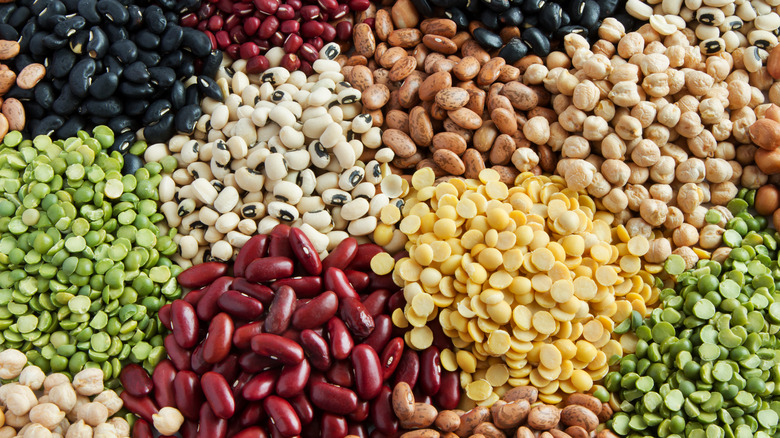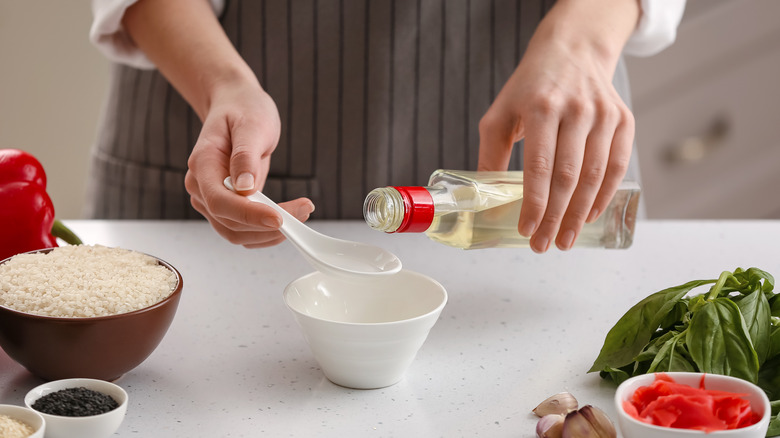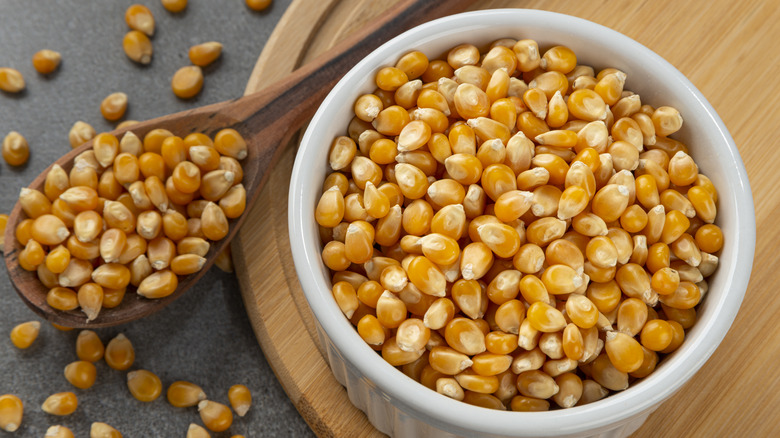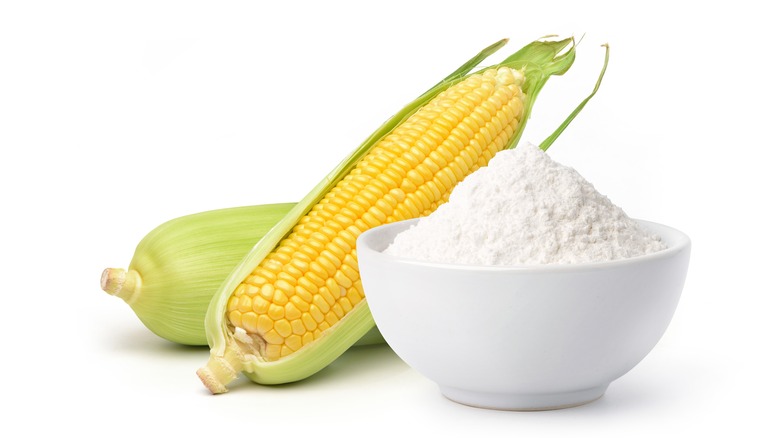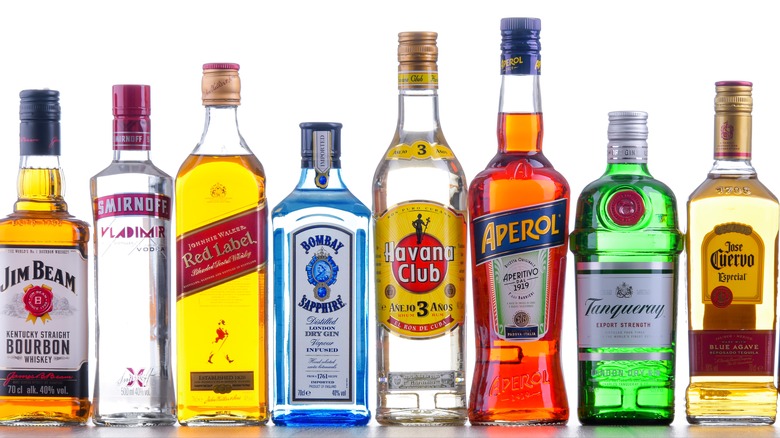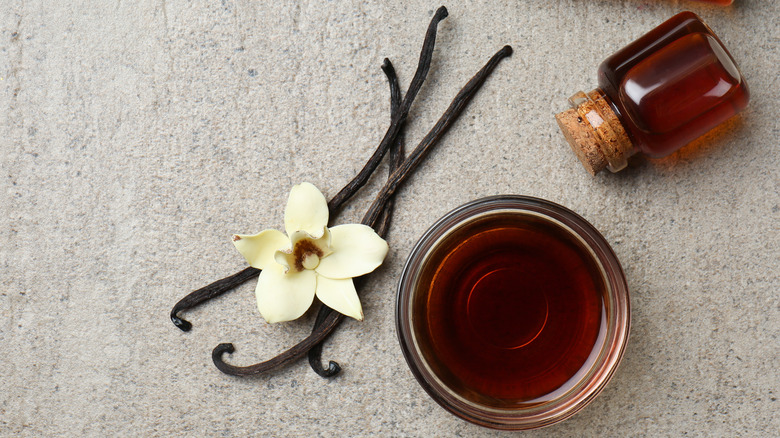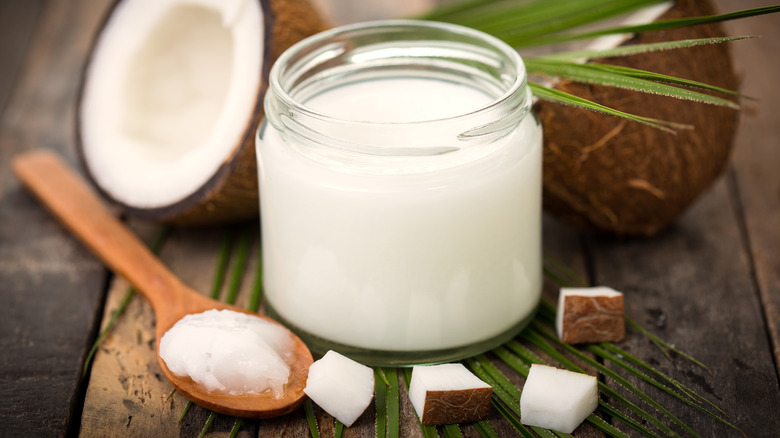14 Foods That Don't Need An Expiration Date
If you're skeptical of expiration dates, you're not alone. Often, a product will pass its expiration or "best by" date but look and smell perfectly normal. But are these foods safe to consume?
As it turns out, most expiration dates aren't required by law. Manufacturers merely suggest dates based on how long they expect that food to last. While companies want products to be safe and flavorful, they often underestimate the food's shelf life. Some products last much longer, assuming they are packaged and stored correctly.
How quickly food spoils depends on its water content and environment, among other factors. Fresh meat, dairy, and produce undoubtedly go bad and should be tossed. Cooking oils and grains also go rancid when exposed to heat or light, and despite rumors, even Twinkies eventually spoil. However, highly acidic foods or those with little water don't tend to grow pathogens as quickly. They're not as sensitive to environmental elements, so they retain flavor and texture over time. This is good news if you have a pantry full of outdated items you're hesitant to toss.
So what foods last forever, and how is this even possible? Keep reading to learn which foods don't need an expiration date and can sit on your shelf indefinitely.
1. Salt
Salt is essential to life — and perhaps the most common seasoning. It's hard to imagine cooking anything savory without adding a little salt to the mix. And if your salt has been sitting on the shelf for years, there's no need to worry. Salt that isn't iodized or seasoned can last forever.
Salt can even increase the shelf-life of other foods. When added to items, it draws out moisture and creates an inhospitable environment for bacteria, yeast, or mold. Salt is used in pickling and curing because it adds that super salty touch while keeping the food safe. Think of meat — when freshly cooked, it won't last more than a few days. But meats that are dry-cured with salt can last a couple of years. That's good news if you're a fan of salt cod or cured ham.
You might see a "consume by" or "best by" date on salt. However, Morton Salt confirms that pure salt has no expiration date, and even salt blends can last 2 to 5 years. Plus, salt's flavor won't disappear over time -– it's impossible for salt to lose its saltiness.
2. Honey
Honey is the nectar of the gods and, apparently, also of kings. During the 1922 excavation of King Tut's tomb, archeologists found a honey pot, and they even tasted it to verify that this sticky sweet goo was, indeed, honey (via the McGill Office of Science and Society). Since King Tut was buried in the 14th century B.C., the discovery proves that this golden treasure really does last forever.
Honey owes its long-lasting nature to its dense consistency and acidity. Although nectar has a high water content, bees remove most of this in the honey-making process, leaving just the thick, sugary substance. Amina Harris, executive director of the Honey and Pollination Center at the University of California, Davis, further explains, "[Honey] has a pH that falls between 3 and 4.5, approximately, and that acid will kill off almost anything that wants to grow there," (via Smithsonian Magazine).
So if you've just uncovered an ancient jar of honey in your pantry, rest assured it's safe to consume. While it may crystallize or form a white film over the top, this is perfectly normal and a sign that your honey is natural. So crack open that jar and enjoy a taste of nature's candy.
3. Maple syrup
Maple syrup and pancakes are a match made in culinary heaven. This thick liquid has a brown hue and tastes sweet and woody with hints of burnt caramel or molasses. And although it makes the perfect breakfast condiment, it also goes well with savory dishes like cornbread and roasted veggies.
The USDA recommends storing maple syrup for up to one year in the pantry or fridge. But if you've kept a bottle in your cupboard for longer, it's probably fine. Hillsboro Sugarworks in Vermont says unopened syrup is good indefinitely. Even if it becomes darker with time, it's safe to consume and will still taste delicious.
Maple syrup isn't as thick as honey, but it does have enough sugar to stave off bacteria in colder temperatures. Therefore, you should store it in a cool pantry or the fridge. Once opened, maple syrup should be refrigerated since it isn't immune to mold. A thin layer of mold can develop on the surface, but you can easily scoop it off and eat the rest.
4. Sugar
Has that sugar in your cupboard ever gone moldy? It's highly doubtful because bacteria can't grow in such a high-sugar environment.
Condensed sugar doesn't have the water microorganisms need to reproduce, making it an excellent preservative. What happens to fresh fruit when it's left out for weeks? It decays and develops a thick layer of mold. However, sweetened products like jams and candied fruits last much longer. A paper published in Foods explains that sugar preserves these foods through osmosis, meaning it draws water out of food and replaces it with sugar. Pathogens can't survive without water, leaving you with safely preserved treats.
Although you never need to worry about sugar spoiling, it's best used within 2 to 3 years. After this, it'll naturally start to harden and form clumps. The sugar is still edible, but it'll make cooking a bit frustrating — and the flavor does begin to change after several years. You should also keep packaged sugar away from heat as it can melt, changing its chemical structure and taste.
5. Uncooked white rice
White rice lasts forever, but brown rice has a shelf life of about six months, according to The Pioneer Woman. So what's the difference between the two? Brown rice is a whole grain with bran and germ. The bran has an oil layer that goes rancid with time. But in white rice, the bran and germ are removed, so this isn't an issue.
There are some things to bear in mind when preparing and storing rice. The Bacillus cereus bacteria comes from soil and plants, including rice, and can lead to food poisoning if consumed, as noted in a study published by the University of Florida IFAS Extension. Adequate cooking and heat are enough to prevent food poisoning. However, the bacteria's spores can often survive high heat. When rice is left out at room temperature or reheated, these spores can multiply into toxic amounts (via the National Health Service). Therefore, it's best to consume freshly cooked rice and store the rest properly. If it starts to cool, put it in the fridge, and reheat it at high temperatures.
6. Instant coffee
If an apocalypse hit, you wouldn't have to give up coffee. Instant coffee lasts a whopping 20 years, according to Healthline, so you can stock up and stay perfectly caffeinated for decades to come.
While regular coffee grows mold easily, instant coffee lasts longer due to its production methods. This is why you'll usually find a "best buy" date rather than an expiration date on these products. Instant coffee is essentially dehydrated coffee. Regular coffee is made from roasted and ground coffee beans, but instant coffee goes through an additional process. It's freeze-dried or spray-dried to remove moisture. Instant coffee doesn't need fancy equipment — just pour hot water over it, and it's ready to go.
So if instant coffee lasts longer and is easier to make, why aren't we all drinking it? The answer is simple: Regular coffee tastes undeniably better. Regular coffee has a fuller flavor, while instant coffee tends to be more bitter and made from lower-quality beans. However, there are many instant coffee brands, and you are bound to find one that suits your needs. It will undoubtedly lose some flavor if kept for 20 years, so store it in a cool, dry place for the freshest taste.
7. Powdered milk
If you have both instant coffee and powdered milk, you can make a latte for the next decade. Despite its "best by" date, powdered milk lasts 2 to 10 years when sealed correctly, per the USDA (via Food & Wine).
Powdered milk can last so long because it's been pasteurized and dried. In the pasteurization process, milk is heated to high enough temperatures to kill off harmful bacteria. The dehydration process eliminates moisture, so even if that bacteria survived, it wouldn't be able to multiply. But once mixed with water, milk powder is susceptible to the same spoilage as fresh milk.
Powdered milk can offer you all the same nutrients as regular milk, including protein, calcium, and B vitamins. It comes in full-fat, reduced-fat, and nonfat versions and may be fortified with vitamins A or D. While it can be nutritious, powdered milk doesn't have the same flavor as its fresh counterpart. It's creamy and slightly sweet but can taste chalky, a common downside to powdered beverages.
8. Dry beans
Dried beans are an excellent source of emergency food and are commonly distributed by food organizations such as the U.S. Agency for International Development's Food for Peace Program. They are easy to transport, have a long shelf life, and have high nutrient content. A Brigham Young University study found that pinto beans stored for 30 years were still edible and maintained their digestible proteins.
To make dried beans, farmers cut the plants and leave the beans on the stalk to dry. In manufacturing, beans may undergo further drying processes before hitting the shelves. Because the beans' moisture is removed, it lowers the chance of food-borne illnesses.
Although they don't have an expiration date, the shelf life of beans depends on how they're stored. According to Utah State University, beans packaged in plastic food bags can last a minimum of one year, while food bags made from polyester last 10 or more years. Like all foods, beans should be stored in airtight containers away from heat or light.
9. Vinegar
Babylonians discovered vinegar in 5,000 B.C. when grape juice was accidentally left to ferment into this more acidic solution, as noted in a paper in Medscape General Medicine. Since then, it's been used as a cooking product, homeopathic remedy, and cleaning agent. Even Hippocrates, the father of modern medicine, used vinegar to treat patients over 2,000 years ago.
Throughout history, it's also been used as a pickling agent. When food items are mixed with vinegar, salt, and water, it can extend their lifetime and give them that sour, salty flavor we love. Almost all fruits and veggies can be pickled, but crowd-pleasers tend to be cucumbers, radishes, beets, and carrots. There are several types of vinegar, and some are better for pickling than others. Pickling vinegar should have an acidity of 5% or more, which includes distilled white, sherry, and wine vinegars (via Preserve & Pickle).
Vinegar is so acidic it doesn't spoil — even when kept outside the fridge. So you can keep those bottles indefinitely and use them in various ways. Whether you want to make a healing tonic with apple cider vinegar or dilute white vinegar to clean countertops, these products are highly reliable.
10. Popcorn kernels
Popcorn dates back thousands of years, way before microwaves were ever invented. According to the Harvard University Archives, the oldest ears of corn were found in New Mexico and are roughly 4,000 years old. Based on this, we know that Native Americans also consumed this snack but cooked it differently. They probably roasted it over the fire, letting the kernels puff out instead of pop.
Nowadays, most people use microwaveable bags of popcorn that are seasoned and contain additives. The extra ingredients, particularly butter, do spoil. However, plain kernels never expire, and there might be proof. In Chilean burial grounds, scientists found 1,000-year-old popcorn kernels that were surprisingly still poppable (via Popcorn.org). If these kernels were okay, there's clearly no need to worry about your old popcorn stash.
It makes sense that popcorn lasts so long. Kernels have a hard outer shell that protects the soft interior from air and pathogens. The starchy inside stays preserved until enough heat is applied, bursting it open. As such, unpopped plain kernels don't need an expiration date. They can be kept in your pantry for ages and are best cooked and seasoned immediately before serving.
11. Cornstarch
You might have cornstarch hidden in your cupboards and not even know it. However, most people use this ingredient sparingly, so they tend to forget about it. If you do come across an old bag, don't worry — it's probably safe to consume.
Cornstarch is typically used as a thickener in sauces and soups. However, it can also replace flour in desserts or fried foods if you're gluten-free. Outside the kitchen, it can soothe skin or even remove grease stains. And if you remember your elementary science class, you might recall mixing cornstarch with water to unveil its non-Newtonian properties.
Cornstarch may have many uses, but it's still hard to finish an entire bag. Luckily, it lasts forever, assuming it's sealed and stored in a cool, dry location. While some cornstarch comes in resealable packaging, any airtight container should work. As long as it avoids moisture, you can consume it for a lifetime.
12. Hard Liquor
Although not technically food, hard liquor lasts forever and doesn't even need to be refrigerated. Because of the high alcohol content, hard liquor can withstand harsh environments and won't grow mold or bacteria. In fact, it's deadly to most tiny organisms — and also to humans in larger amounts.
The higher the alcohol content, the longer it lasts. Once opened, wine might only last a few days, but hard liquor is good for several years. After that, it may lose some of its flavors but is still safe to consume in normal amounts.
Like food products, the best way to preserve your liquor is to keep it in a cool, dry place away from light. Air, temperature, and light can alter the alcohol's taste and color (via Iowa State University). Liquor exposed to air begins to oxidize, which can lead to a more acidic taste. Heat and direct sunlight can also lead to oxidation and evaporate liquor molecules. Even if your liquor is exposed to the elements and changes flavor or appearance, its expiration date alone won't cause sickness.
13. Vanilla extract
Vanilla extract has a strong flavor, and a little bit goes a long way. That's why it comes in such small bottles and lasts forever. Plus, it never expires, so you can use it for years to come.
Vanilla extract tastes like — shocker, vanilla! It's a rich, condensed flavor with floral and caramel notes. It's excellent in cooking because it can bring out subtle flavors in dishes and gives the overall taste more depth. It's used in cakes, savory marinades, or even in cocktails and coffee.
Pure vanilla extract has an alcohol base, which helps it last indefinitely (via USDA). However, because of the alcohol, it reacts similarly to hard liquor. When exposed to heat or air, the alcohol will start evaporating, making the extract more bitter. It's best to keep it in a cool, dark place. But you should never put it in the fridge since it'll change consistency and become cloudy. Even if your vanilla extract loses flavor and aroma, it's still safe to consume.
14. Virgin coconut oil
Coconut oil has become wildly popular in the past decade. As health-conscious consumers move to more natural products, people are using coconut oil in everything from cooking to skincare. In diet circles, it's common in vegan cooking and bulletproof coffee and is seen as a healthy alternative to other oils.
Besides its tasty coconut flavor, this oil is so popular because it has antimicrobial properties and a type of fat called medium-chain triglycerides. In a study published in Heliyon, researchers found that coconut oil stopped the growth of harmful bacteria while simultaneously improving the immune system. Coconut oil is one of the few foods packed with healthy medium-chain triglycerides. These fatty acids support one's metabolism and lower inflammation. A PLOS ONE study showed that these medium-chain triglycerides also improved exercise performance, which can help people shed weight.
Coconut oil can last longer than most oils because it has less unsaturated fat, which prevents oxidization. Refined coconut oils are primarily used in cooking and have a shelf life of 1 to 2 years. However, unrefined or virgin coconut oil is good for up to 5 years.

